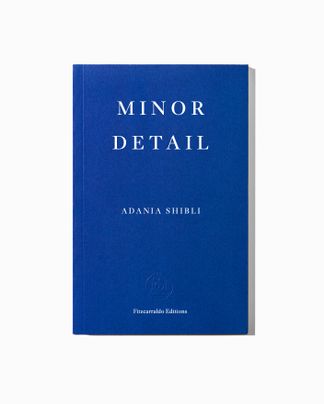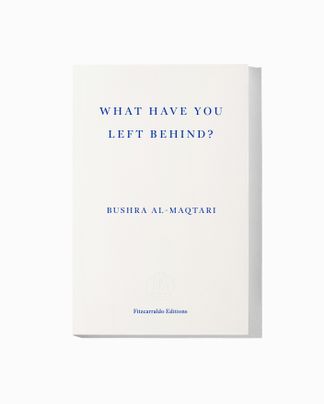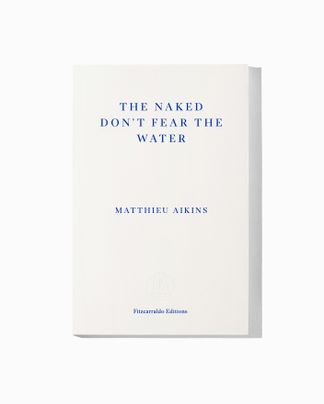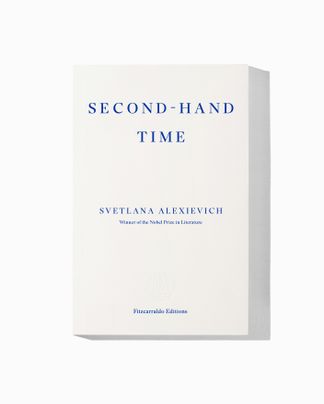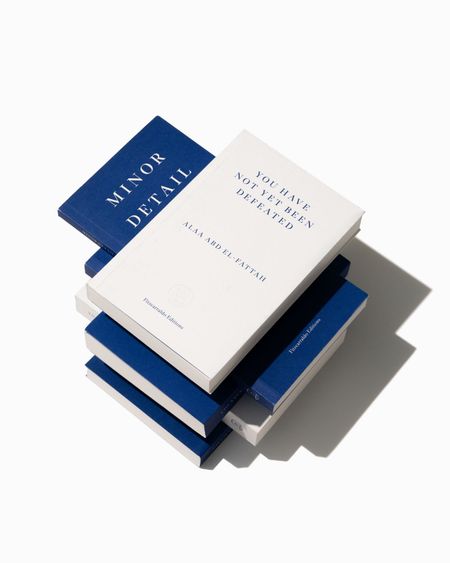Alaa Abd el-Fattah is arguably the most high-profile political prisoner in Egypt, if not the Arab world, rising to international prominence during the revolution of 2011. A fiercely independent thinker who fuses politics and technology in powerful prose, an activist whose ideas represent a global generation which has only known struggle against a failing system, a public intellectual with the rare courage to offer personal, painful honesty, Alaa’s written voice came to symbolize much of what was fresh, inspiring and revolutionary about the uprisings that have defined the last decade. Collected here for the first time in English are a selection of his essays, social media posts and interviews from 2011 until the present. He has spent the majority of those years in prison, where many of these pieces were written. Together, they present not only a unique account from the frontline of a decade of global upheaval, but a catalogue of ideas about other futures those upheavals could yet reveal. From theories on technology and history to profound reflections on the meaning of prison, You Have Not Yet Been Defeated is a book about the importance of ideas, whatever their cost.
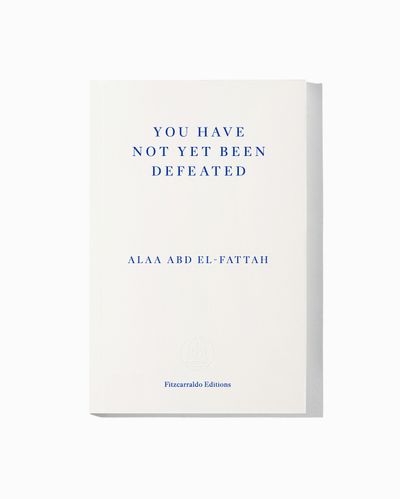
You Have Not Yet Been Defeated: Selected Works 2011–2021
Translated by a collective, with a foreword by Naomi Klein
French paperback with flaps, 444 pages
Published 20 October 2021
You Have Not Yet Been Defeated: Selected Works 2011–2021
Translated by a collective, with a foreword by Naomi Klein
INTRODUCTION
Alaa Abd el-Fattah has spent seven of the eight years since the counter-revolution led by General Abdel Fattah el-Sisi in prison. He is in prison for his ideas and his words. Here, for the first time, a collection of Alaa’s work is brought together, assembled and translated by his family and friends.
The reader is introduced to Alaa at the peak of the energies unleashed by the 2011 revolution in Egypt as he surveys the constitutional history of South Africa. Writing for a national broadsheet, al-Shorouk, he is setting the stage for the following day’s launch of the ‘Let’s Write Our Constitution’ campaign, an initiative in mass democracy inspired by South Africa’s Congress of the People of 1955, and an attempt to turn the opportunities following the fall of Mubarak four months earlier into irreversible legislative gains.
Three short months later, the military kill twenty-six protestors at Maspero and we follow Alaa into the massacre’s aftermath in ‘To Be With the Martyrs, for that is Far Better’, his account of the night spent in the Coptic Hospital, fighting for autopsies to be performed. Two weeks after its publication he is summoned by the Military Prosecutor.
Imprisoned while his wife delivers their first child, Khaled, and his mother is on hunger strike, Alaa’s writings from prison in this period are urgent and impassioned yet always connected to broader political developments and attuned to their minutiae.
Following Alaa’s release, we find ourselves in the swirling waters of 2012–13: relentless street protests and industrial actions, parliamentary and presidential elections, constitutional crises, the Muslim Brotherhood’s victory and catastrophic year in power. In this period Alaa writes very few long-form essays, instead tweeting and posting to Facebook, hosting public fora, appearing on television talk shows and speaking at rallies. We tried to use Alaa’s social media output to tell the story of 2012–13, but we must bear in mind the sheer volume of his output. He has tweeted a total of 290,000 times since 2007 – about 100 books’ worth of tweets.
Our social media selections are an attempt instead to show how he uses the internet: as a medium not only for transmission outwards, but of collecting information, combining and disseminating, as a space for debate, a personal diary, a public diary, a podium and a comedy stage. Alaa writes relentlessly, his brain always engaged with a multitude of topics simultaneously, his patience for engagement with other people seemingly inexhaustible: there is no opinion that is not worth engaging with.
August 2013 brings the massacre at Rabaa el-Adaweya Square in Cairo. The public killing of hundreds of supporters of ousted Muslim Brotherhood President Mohamed Morsi is designed to silence a country that considered itself in an ongoing state of revolution. But Alaa refuses to be silenced, and his Facebook posts, ‘Above the Sound of Battle’ ‘What Happened at Abu Zaabal?’ and ‘You Know the Killing Was Random’ are widely remembered as beacons in the reeling darkness of those days.
In August 2012 Mohamed Morsi had appointed General Abdel-Fattah el-Sisi as the new Minister of Defence, replacing the aged and unpopular Field Marshall Hussein Tantawi. Tantawi had held the position for the previous twenty years, had overseen the removal of Mubarak the previous year, and as head of the Supreme Council of the Armed Forces (SCAF) had been de-facto in charge of the country through the transitional period up to Morsi’s electoral victory. Tantawi’s removal by the newly elected civilian was greeted as a revolutionary act – but the president had sealed his own downfall by elevating the ambitious and ruthless Sisi to the position from which he would soon overthrow him.
Once the police had decimated the Muslim Brotherhood – with the massacre at Rabaa, the round-up of the leadership, the arrest of thousands of men and women, and the total clampdown on media – they turned their attention to the revolutionary youth. A colonial-era British law outlawing protest was re-animated and turned against the street, and in November 2013, three months after Rabaa, Alaa was arrested again. He was among the very first targets, along with two of the co-founders of the 6 April Youth Movement, Ahmed Maher and Mohammed Adel.
In this next spell inside, Alaa writes four major essays in four months (‘Graffiti for Two’, ‘Autism’, ‘Everybody Knows’ and ‘Lysenko Country’). His pieces are read widely, published in multiple newspapers simultaneously, reported on as news in the national press. The revolution did not yet believe itself to be over. But the machinery of the state, the police, the judiciary, the media, have set to work on grinding the disobedience out of the people. Alaa’s trial, ostensibly for organizing a protest, is long and complex. One judge recuses himself, and his replacement has Alaa arrested as a fugitive as he stands outside the courthouse, barred from entering. Over 2014 he is released briefly twice – for two months in the spring, and one month in the autumn. But it was in the summer that Alaa’s father died.
Ahmed Seif el-Islam was a key figure in his son’s life. A member of a militant communist cell who was imprisoned and tortured in the 1980s and emerged from incarceration with a profound attachment to the idea of the law and the opportunities that it might present, even within a dictatorial police state. He went on to found the Hisham Mubarak Law Centre and his clients ranged from the young men charged with the Taba terrorist bombings of 2004, to dissident bloggers, to striking workers, to the men persecuted for their perceived sexuality in the notorious Queen Boat Case. The positions he took, and the organizations he helped build played a part in creating the conditions for the 2011 revolution. But, in 2014, exhausted by his years on the frontlines, and with two of his children in prison (Alaa’s sister, Sanaa, had been arrested recently at a protest for prisoners), his heart gave out.
Eighteen days later, Alaa was briefly released from prison, long enough to deliver an address at the memorial for his father, but one month later, on 27 October, was sentenced to five years in prison. Inside, he went quiet for a year.
(…)
Alaa Abd el-Fattah was released from prison in Egypt on 23 September 2025 after spending most of the last decade in prison. Read the reports in the BBC and Guardian.
‘The text you are holding is living history.’
— Naomi Klein, author of This Changes Everything
‘Don’t read this book to be comforted. Read it to be challenged, terrified, enlightened, moved, and amazed.’
— Kamila Shamsie, author of Home Fire
‘Alaa is the bravest, most critical, most engaged citizen of us all. At a time when Egypt has been turned into a large prison, Alaa has managed to cling to his humanity and be the freest Egyptian.’
— Khaled Fahmy, author of All The Pasha’s Men
‘Alaa is in prison not because he committed a crime, not because he said too much, but because his very existence poses a threat to the state. Those who are bold, those who do not relent, will always threaten the terrified and ultimately weak state which must, to survive, squash its opponents like flies. But Alaa will not allow himself to be crushed like that, I know.’
— Jillian C. York, director of International Freedom of Expression at the Electronic Frontier Foundation
‘Alaa is a philosopher of everyday life and lifelong struggle; he doesn’t merely find meaning in that which we go through, especially in dark political moments, but creates meaning and gives it form in writing. And he does so from a highly entrenched and implicated place in the present. His thoughts know no frontiers; they pierce through local contexts to inspire new modes of thinking about the chaotic substance of politics.’
— Lina Attalah, editor in chief of Mada Masr
‘There is a defiant joy about his prose. He has turned the dark prison space of his jail into a bright public sphere where he is far more liberated inside his solitary cell than he would have been freely floating in the streets of Cairo. In his defiant prose, in the new Arab personhood he exemplifies, Alaa Abd el-Fattah is a living testimony that the Arab revolutions have been a resounding success.’
— Hamid Dabashi, Middle East Eye
‘It is this steadfast devotion to the Egyptian people that make Alaa’s entries in You Have Not Yet Been Defeated the most honest and compelling document that we have of the state of Egypt today. We learn that, in Alaa’s reluctance to grasp the limelight, there isn’t space for ego, nor time for complacency when lives are at stake.’
— Benjamin Ashraf, The New Arab
‘[You Have Not Yet Been Defeated] is really a book about January and its aftermath. Not in the form of a straightforward journalistic recording of events, but an attempt to convey the passions and the frustrations that the moment made possible. Throughout the chronologically arranged essays, the reader gets a sense of how Alaa’s voice changes as his imprisonment continues and the world around him appears even more impervious to change. The focus on the personal is therefore not simply a quirk of Alaa’s style of expression; it is testament to the fact that, in Egypt, the boundaries between the personal and the political are not respected by political authorities…. We should not read this book to make an exception of Alaa. At his best, he attempts to speak to, and to bring into existence, a movement bigger than himself.’
— Nihal El Aasar, Jacobin
‘“Fix your own democracy,” Abd el-Fattah encourages us, from his cell; Egypt’s rulers attempt to isolate, fragment and conceal resistance because it needs a global ecosystem to flourish. What can any one person do with a legacy of pain, struggle and courage? There are no easy solutions here, but You Have Not Yet Been Defeated is a heartbreaking, hopeful answer.’
— Rachel Aspden, Guardian
‘You Have Not Yet Been Defeated is both an archive and a blueprint: an archive of a revolution deferred, and a blueprint for bringing the world that it dreamt of into existence.’
— Gautam Bhatia, The Wire
‘That the Egyptian activist is writing from a cell reminds us of the fragility of our remaining freedoms; that his arguments continue to be self-interrogating, engaging and complex is a rebuke to the comfortable moral certainties of social media.’
— Times Literary Supplement
‘Alaa Abd el-Fattah emerges as a political observer who has documented and analysed Egypt’s tragic history since the Arab Spring like no one else; someone who does not only look deep into his own society, but sees the bigger picture beyond Egypt’s national borders.’
— Qantara
‘Wherever they are now to be read, his essays will have a liberating effect that has to be internalized, perhaps particularly in Western readers, who must now return this favor, to Alaa and to Egypt.’
— Julian Sayarer, Jacobin
‘Alaa’s book is best left unabridged – allow it to swoop on you with its truths. Reach back to it at regular intervals, let it be a map for your own thoughts on another world we must urgently hope is possible. One where prisons – not prisoners – are erased.’
— Barathi Nakkeeran, The Hindu
Alaa Abd el-Fattah is an Egyptian writer, technologist and political activist. He has been prosecuted or arrested by every Egyptian regime to rule in his lifetime and has been held in prison for all but a few months since the coup d’état of 2013. Collected here by his family and friends, for the first time in English, are a selection of his speeches, interviews, social media posts and essays since the outbreak of revolution in January 2011 – many written from inside prison.

